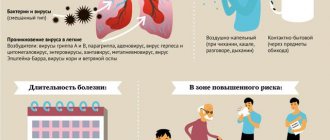Loss of smell
A person smells through receptors. Molecules of substances carrying aroma enter the receptors, these waves are transmitted along the nerve endings to the brain, where this impulse is processed. Most often, loss of smell occurs in men, much less often in women. With age, the risk increases, and you need to be more careful about your body.
There are different types of loss of smell:
- Hyposmia is an extremely poor perception of smells. Also, with hyposmia, there is an incomplete loss of smell, i.e. only for certain smells.
- Hyperosmia is, on the contrary, excessive sensitivity to odors.
- Cacosmia - perception in this case is turned upside down. Attractive smells seem disgusting.
- Anosmia is the complete loss of olfactory processes. It is formed due to colds, and in some cases even after a stroke.
Loss of smell can occur from birth, due to the fact that the respiratory organs have not had time to form properly. You can also acquire anosmia during your life.
Causes of loss of smell
During the loss of smell, the receptors will not respond to stimuli. The brain does not receive signals and does not distinguish smells. If the problem is in the central nervous system, then the receptors, on the contrary, send impulses to the brain, but the brain does not perceive them. And sometimes it may be that the receptors in the nose recognize and send odors to the brain, but along the way they are blocked.
ARVI and COVID-19
Loss of smell can be a consequence of a common cold, flu or acute respiratory viral infection. In this case, swelling of the mucous membrane occurs, which disrupts not only the breathing process, but also deprives the receptors of their functions - transmitting impulses to the brain.
Not long ago, doctors found out that loss of smell is, in most cases, also a symptom of coronavirus. It appears in 80% of cases on about 3–5 days. Moreover, during this period the person may not experience any other symptoms. It is known that the nasal mucosa is the first to encounter viruses and bacteria, and the immune system begins to work from the nose to destroy as many viral agents as possible. Perhaps damage to the receptors and cells of the mucous membrane occurs precisely because of the “smart” attack of the virus in order to break the defense at the attack stage and easily penetrate the body.
Another opinion is that the sense of smell disappears due to the body’s protective reaction to the virus; the receptors sacrifice themselves to prevent the infection from spreading. The sense of smell returns approximately 2 weeks after complete healing. But there are rare cases when the return is delayed and the sense of smell is fully restored within several months.
According to statistics, in most cases this symptom indicates that the disease will not develop into a particularly acute form with serious consequences. Most often, anosmia develops immediately after the incubation period, 3-4 days after the viral agents have entered the body, but before the appearance of other symptoms - sore throat, cough, fever, rash and chest congestion, weakness and fever.
According to another version, with covid, olfactory receptors are damaged at the level of the nervous system, when the transmission of impulses from the receptors to the brain and back is blocked by viral agents. But why this happens and how the virus acts in the body of a particular person is an area that has not been sufficiently studied.
That is why sleeping pills and sedatives are often prescribed in doctors’ protocols. To support the nervous system that is being attacked.
Also, we can assume that in mild, moderate and severe forms of the disease without critical complications, the return of the sense of smell with proper treatment of coronavirus indicates that the virus is receding, even if other symptoms are partially preserved.
Parkinson's disease, Alzheimer's disease
Loss of smell in such diseases is the most striking symptom. Sometimes it can become the very first and earliest sign of impending irreversible disorders in the brain. Thus, scientists can determine the risk of disease for a person by how he is able to recognize, remember and remember smells.
In this case, we have to say that the loss of smell is exclusively neurological in nature. Atrophic changes in the cerebral cortex, characteristic of these diseases, affect the central part of the olfactory analyzer. According to MRI, degeneration processes affect the primary olfactory cortex, hippocampus, thalamus and hypothalamus. Which inevitably leads not only to disturbances in coordination activity, but also to memory loss and impaired sense of smell.
Other causes of loss of smell
- Allergy. If a person is susceptible to allergic reactions to the smells of flowers or something else, his nasal cavity may become inflamed.
- Injuries. If the nose or brain is injured, the sense of smell may disappear immediately.
- Age. The older a person gets, the processes in his body slow down. This happens with the membranes of the nose. Older people are more likely to experience dryness and atrophy of the nasal mucosa.
- Tumor. If a benign tumor is found, it is removed and the sense of smell gradually returns.
- Polyps. New growths in the nose can interfere with olfactory processes.
- Smoking. Nicotine destroys the nerve endings in the nose, this happens gradually, but can lead to a complete loss of smell.
- Neurosis. Loss of smell can be caused by long-term emotional problems or a lot of stress.
- Burns. Toxic vapors, when inhaled, can burn the nasal mucosa or lubrication with alcohol-containing liquids.
- Incorrect structure of the nasal cavity.
- Lack of vitamins (vitamin A) or other substances in the body.
Consequences of loss of smell
Problems in the perception of smells are a big problem that has a great impact on the entire body. Bright and juicy aromas of food trigger the digestive system and stimulate the secretion of gastric juice. If a person cannot smell the food he eats, the gastrointestinal tract will also suffer.
If viruses or harmful substances enter the body through the nose, a defensive reaction is provoked, for example, sneezing. If the receptors do not awaken a defensive reaction when the sense of smell is lost, then harmful substances will continue to freely penetrate deep into the body, causing even more damage.
How to treat a smell disorder?
Smell and taste disorders are treated by an ENT doctor. An accurate evaluation of a smell disorder will include a complete history, physical examination of the nose and throat, tests, imaging tests, and olfactory sensory receptor tests.
Diagnosis by a physician is important to identify and treat the underlying cause of the loss of smell. If the problem is caused by medications, reducing the dosage or changing the type of medication should be discussed. If growths such as polyps are restricting air flow into the nose, surgery may be required to remove them and restore the sense of smell.
Most patients regain their sense of smell when they recover from the illness that caused it. In some people, the sense of smell recovers on its own, without any therapy. For example, a loss of smell after Covid most often goes away on its own after a maximum of a few weeks.
The ENT clinic in Chertanovo treats smell disorders due to coronavirus and not related to it, using the full range of effective methods of physiotherapy and conservative treatment.
Restoring the sense of smell
If you have a long-term loss of smell, you should immediately go to the clinic for an appointment with an otolaryngologist. If you treat yourself, you can worsen the current condition.
Recovery can be:
- Surgical.
Such intervention may be required in advanced cases (for example, with a tumor or deviated septum). Then the surgeon performs the operation.
- Medicinal.
The doctor prescribes a list of necessary medications, from nasal rinses to antibiotics, antiviral and antifungal agents.
- Physiotherapeutic.
Treatment may require physical therapy. The doctor prescribes heating or inhalation, and in some cases laser treatment is performed.
- People's
No one has abolished traditional medicine, but in no case should you prescribe decoctions for yourself. The doctor may prescribe a decoction for rinsing the nose from chamomile and oak bark or nasal drops based on aloe juice.
- Complex.
Those. This is the application of all types from physical therapy to surgical.
Diagnosis for loss of smell
Diagnosis of anosmia or hyposmia comes down to the following studies:
- Anamnesis collection. At the appointment, the doctor will ask when and under what circumstances the patient lost his sense of smell; whether there have been previous episodes of anosmia or hyposmia. The patient will also be asked about associated symptoms to narrow down the range of possible diseases and conditions. So, for example, if the patient also complains of nasal discharge, the doctor will clarify the nature of the discharge - watery, mucous or purulent. Also, during the interview, the doctor will want to know about the medications that the patient is taking or has taken.
- Olfactory tests. The doctor determines the degree of impairment of the sense of smell using a special device - an olfactometer. The patient's eyes are closed and standardized odorants are given to smell. After a series of such tests, the sensitivity of the olfactory analyzer is assessed.
- Examination of the olfactory organs. If necessary, the doctor prescribes an examination of organ systems, primarily the nasopharynx, as well as the nervous system. Examination of the nasal cavity is carried out by rhinoscopy. If there is nasal discharge, the discharge is taken for bacteriological examination.
- Allergy tests. If an allergy is suspected, the patient is referred to an allergist who conducts allergy tests.
- Other studies. Depending on the doctor’s suspicions, the general condition and age of the patient, a number of other studies are also prescribed, for example, tests that evaluate the patient’s mental activity.
Forecast
The prognosis for the patient depends on what is causing the pathology. If the systems are not irreversibly damaged, but there is simply an obstruction of the nasal passages, due to which aromas do not reach the olfactory center, the prognosis is generally favorable, since in 95% of cases the sense of smell is completely restored after therapy. In case of damage to the olfactory nerve, central nervous system or age-related changes, due to the fact that it is impossible to restore a normal state, the prognosis for the patient will often be poor.
Causes of anosmia
Nasal congestion due to a cold, allergies, sinus infection, or poor air quality are the most common causes of anosmia. Other provoking factors:
- Nasal polyps are small, benign growths in the sinuses that block the nasal passage.
- Trauma to the nose or head.
- Viral infections (this includes anosmia due to coronavirus).
- Exposure to toxic chemicals such as pesticides or solvents.
- Certain medications, including antibiotics, antidepressants, anti-inflammatory drugs, heart medications, and others.
- Drug use.
- Tobacco abuse. Smoking can dull your senses, including your sense of smell.
- Elderly age. Like vision and hearing, the sense of smell can weaken with age. In fact, the sense of smell is most acute before the age of 60, after which it begins to decline.
- Certain diseases such as Alzheimer's disease, Parkinson's disease, multiple sclerosis, congenital pathologies, hormonal disorders.
- Radiation therapy to the head and neck.
Treatment
In most cases, loss of smell in the above diseases is reversible. There is currently no specific treatment for anosmia or hyposmia. The patient is treated for the underlying disease, after which, over time, the olfactory function is restored.
Photo: Y-Boychenko / Depositphotos
As a rule, conservative therapy is used for these diseases. This is taking medications, sometimes in combination with physiotherapeutic methods of treatment. Some pathologies (for example, polyps or tumors in the nose) require surgery.
The most difficult to treat is anosmia, caused by degenerative diseases of the nervous system or irreversible destruction of the nerve fibers involved in the process of recognizing odors. In particular, this is anosmia caused by Alzheimer's disease or diabetes (which affects the nerve fibers in the body).










